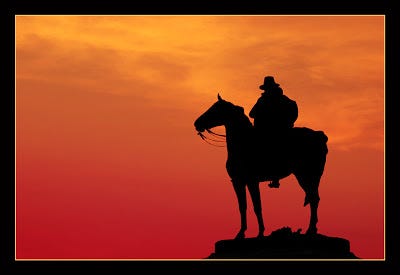Lonesome - Marilynne Robinson
I'm not even quite sure why, but I also liked this little segment from Marilynne Robinson.

Picture from here.
A man in Alabama asked me how I felt the West was different from the East and the South, and I replied that in the West “lonesome” is a word with strongly positive connotations. I must have phrased my answer better at the time, because both he and I were struck by the aptness of the remark, and people in Alabama are far too sensitive to language to be pleased with a phrase such as “strongly positive connotations.” For the moment it will have to serve, however.
...
I remember the evenings at my grandparents’ ranch, at Sagle, and how in the daytime we chased the barn cats and swung on the front gate and set off pitchy, bruising avalanches in the woodshed, and watched my grandmother scatter chicken feed from an apron with huge pockets in it, suffering the fractious contentment of town children rusticated. And then the cows came home and the wind came up and Venus burned through what little remained of the atmosphere and the dark and the emptiness stood over the old house like some unsought revelation.
It must have been at evening I heard the word “lonesome” spoken in tones that let me know the privilege attached to it ... My grandparents and people like them had a picture in their houses of a stag on a cliff, admiring a radiant moon, or a maiden in classical draperies, on the same cliff, admiring the same moon. It was a specimen of decayed Victorianism. In that period mourning, melancholy, regret, and loneliness were high sentiments, as they were for the psalmist and for Sophocles, for the Anglo-Saxon poets and for Shakespeare.
In modern culture these are seen as pathologies – alienation and inauthenticity in Europe, maladjustment and depression in the United States. At present, they seem to flourish only in vernacular forms, country-and-western music being one of these. The moon has gone behind a cloud, and I’m so lonesome I could die.
It seems to me that, within limits the Victorians routinely transgressed, the exercise of finding the ingratiating qualities of grave and fearful experience is very wholesome and stabilizing. I am vehemently grateful that, by whatever means, I learned to assume that loneliness should be in part pleasure, sensitizing and clarifying, and that it is even a truer bond among people than any kind of proximity. It may be mere historical conditioning, but when I see a man or woman alone, he or she looks mysterious to me, which is only to say that for a moment I see another human being clearly.
~Marilynne Robinson
"When I Was a Child"
In When I Was a Child I Read Books
(She goes on to make the interesting point that the “opposition frequently made between individualism on the one hand and responsibility to society on the other is a false opposition as we all know” and that “there is no inevitable conflict between individualism as an ideal and a very positive interest in the good of society”. But I am not so sure I altogether understand how she arrives there (except to say that she thinks communities of people that depend on each other for identity and values are disabled and dangerous), or what precisely is her definition of individualism. You would need to read this essay in entirety for the argument.)

